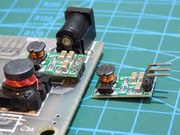1024MAK wrote: ↑Sun Apr 07, 2019 6:42 pm
If you build your own design, there will be absolutely no ready made software for it. So you will need to write some software yourself. The Z80 only understands 8 bit binary numbers (bytes) [called machine code]. So to program at this low level in a manner that is a bit friendly to humans, there is assembly language. The mnemonics translate directly into machine code.
If you build a design which is the same as, or compatible with an existing design, then there will be at least some software that you can run on it.
In both cases, you have to give the CPU the start-up code somehow. In the designs that I talked about earlier, this is code that is programmed into a ‘ROM’ chip.
If you have a RS232 serial communications port, it may be possible to transfer program code from another computer (say a PC) into the RAM of your home build computer, and then run that software.
If you have a reasonable fast PC, you can download various emulators for most of the popular 1980s computers. Using cross compilers, you can write and edit source code using a editor on the PC. Then instruct the cross compiler which file you want assembled, and it will produce a file containing the machine code. Load this into the emulator and you can see if it works. Then you can adapt the code to run on your home built computer. [Warning, this sounds easy, but it eats time and can be frustrating at times].
There are many ways to learn. It does not have to be do 1, 2, 3 etc... in a strict order.
If you don’t have any experience building circuits, then I strongly recommend you start with some simple electronic projects first. Learn about the various components. These days, it is easy to find all kinds of interesting stuff via internet searches.
If you can wait for a bit of a delay, buy some bits from China, such as a breadboard, a selection of resistors, capacitors, diodes (1N4148, 1N4001), transistors (2N2222), and some simple logic chips (74LS00, 74LS02, 74LS04), a couple of NE555 timers have a play.
I’ll add some links later...
Mark
